
| Title: | Politics in India: Structure, Process and Policy, 2nd Edition |
| Author/s: | Mitra, Subrata Kumar |
| Abstract: | The second edition of this textbook brings together general political theory and the comparative method to interpret socio-political phenomena and issues that have occupied the Indian state and society since 1947. It considers the progress that India has made in some of the most challenging aspects of post-colonial politics such as governance, democracy, economic growth, welfare, and citizenship. Looking at the changed global role of India, its standing in the G-20 and BRICS, as well as the implications of the 2014 Indian general elections for state and society, this updated edition also includes sections on the changing socio-political status of women in India, corruption and terrorism. The author raises several key questions relevant to Indian politics, including:
• Why has India succeeded in making a relatively peaceful transition from colonial rule to a resilient, multi-party democracy in contrast to its South Asian neighbours? • How has the interaction of modern politics and traditional society contributed to the resilience of post-colonial democracy? • How did India’s economy moribund—for several decades following Independence—make a breakthrough into rapid growth and can India sustain it? • And finally, why have collective identity and nationhood emerged as the core issues for India in the twenty-first century and with what implications for Indian democracy? The textbook goes beyond India by asking about the implications of the Indian case for the general and comparative theory of the post-colonial state. The factors which might have caused failures in democracy and governance are analysed and incorporated as variables into a model of democratic governance. In addition to pedagogical features such as text boxes, a set of further readings is provided to guide readers who wish to go beyond the remit of this text. The book will be essential reading for undergraduate students and researchers in South Asian and Asian studies, political science, development studies, sociology, comparative politics and political theory. |
| Date: | 15 November 2017 |
| More From: |
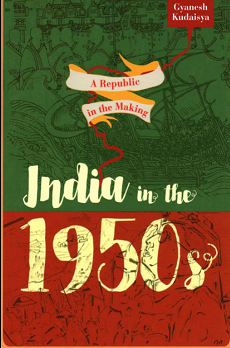
| Title: | A Republic in the Making: India in the 1950s |
| Author/s: | Kudaisya, Gyanesh |
| Abstract: | This work takes a critical look at India in the 1950s, a momentous decade in its contemporary history. It looks at the colossal challenges which India faced in its years after Independence and conveys a sense of the hopes and aspirations, dilemmas and anxieties of its political leadership. It considers the key ideas, paths, and trajectories which were articulated in these years and have left an enduring imprint upon the Republic's fabric as we know it today. The values and personalities from that decade continue to remain a frame of reference, a benchmark for public life in present-day India.
The narrative on the 1950s is woven around certain key themes: the manner in which India moved away from conditions of disorder and turmoil to deal with the 'unfinished business' of Partition; the cartographic reconstruction of India as a political space; the uncertain journey of its democratic institutions; the crafting of inclusive citizenship amidst the ambiguities and anxieties surrounding the minorities; and finally, the audacious project of economic self-reliance through development planning and land reforms. Presented as a broad-brush canvas, rather than a micro-history of the 1950s, this work offers insights into how India came to be transformed in critical ways to anchor itself as a resilient, democratic polity, increasingly coming to terms with societal diversity and heterogeneity. It shall be useful to those interested in unraveling the trails and tracks of India's exciting journey in its formative decade as a new nation. |
| Date: | 5 October 2017 |
| More From: |
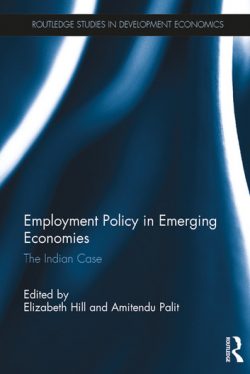
| Title: | Employment Policy in Emerging Economies: The Indian Case |
| Author/s: | Hill Elizabeth and Amitendu Palit. |
| Abstract: | Employment is a critical part of the macro-economy and a key driver of economic development. India’s employment policy over the past three decades provides an important case study for understanding how government attitudes to the labour market contribute to an emerging economy’s growth and development. This study contains important insights on the policy challenges faced by one of the world’s most populous, labour abundant economies in securing employment in a context of structural change.
The book considers India’s approach to employment policy from a national and global perspective and whether policy settings promote employment intensive growth. Chapters in the first half of the volume evaluate India’s approach to employment policy within the national and international context. This includes the ILO Decent Work program, the national agenda for inclusive growth, and national regulatory frameworks for labour and education. Chapters in the second half of the volume focus on how employment policy works in practice and its impact on manufacturing workers, the self-employed, women, and rural workers. These chapters draw attention to the contradictions within the current policy regime and the need for new approaches. Employment Policy in Emerging Economies will interest scholars, policy makers and students of the Indian economy and South Asia more generally. It will support undergraduate and postgraduate academic teaching in courses on economic development, global political economy, the Indian economy and global labour. |
| Date: | 1 August 2017 |
| More From: |
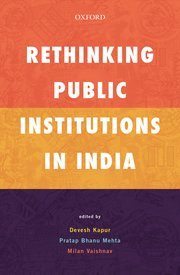
| Title: | Rethinking Public Institutions in India |
| Author/s: | Kapur Devesh, Pratap Bhanu Mehta and Milan Vaishnav. |
| Abstract: | This work analyzes the challenges of governance faced by contemporary India. It argues that while the expansion and growth of India's private sector and a vibrant civil society can fill in for some of the shortcomings of the public sector in the foreseeable future, there is a wide range of core functions from regulation to security, from social inclusion to public goods provision, where the State is-and will be-indispensable. The integrity and responsiveness of the Indian state to the multiple challenges facing the country, both internal and external, will fundamentally determine India's future. The contributions to this volume critically assess different institutions and frameworks-civil services, presidency, judiciary, Parliament, Election Commission, financial and federal institutions, audits and accountability framework, and institutions of local governance. The editors of the volume demonstrate that fundamental state reform will be a necessary condition for India to realize its potential and fulfill its people's aspirations in the twenty-first century. |
| Date: | 27 July 2017 |
| More From: |
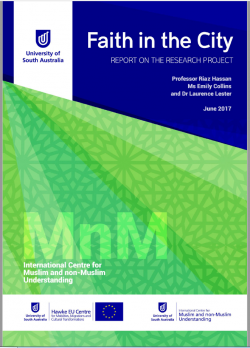
| Title: | Faith in the City: Report on the Research Project |
| Author/s: | Hassan Riaz and Laurence Lester |
| Date: | 1 June 2017 |
| More From: |
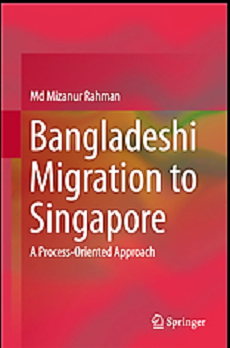
| Title: | Bangladeshi Migration to Singapore: A Process-Oriented Approach |
| Author/s: | Rahman, Md Mizanur |
| Abstract: | This book examines international labour migrants in the context of South–South migration with a focus on Bangladeshi migration to Singapore. Two principal questions in the South–South migration are addressed: Why and how individuals migrate for work; and what impact this temporary form of migration has for migrants and their families. The book adopts a relatively new methodological approach to labour migration by linking different phases that migrants undergo in the migration process and by combining migrants in the host country with their families in the origin country. This is achieved through identifying and addressing six key areas: (i) migration policy, (ii) social imperatives of migration (iii) recruitment, (iv) social worlds of the migrants, (v) remittance process, and finally, (vi) family development dynamics. This book introduces the bari to migration research as a unit of analysis over and above individual and family units. The book reveals how social and cultural forces both initiate and perpetuate migration, and later on influence bari dynamics. |
| Date: | 1 April 2017 |
| More From: |
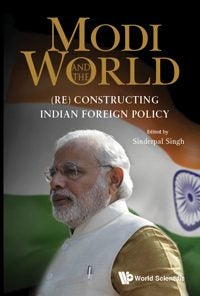
| Title: | Modi and the World: (Re) Constructing Indian Foreign Policy |
| Author/s: | Singh, Sinderpal |
| Abstract: | Contrary to prior expectations, Narendra Modi has expended a significant amount of time, energy and political capital in conducting India's engagement with the outside world since becoming Prime Minister in May 2014. In accordance with wider perceptions about Modi, there were expectations of significant, if not radical, change in Indian foreign policy under his charge. This sentiment led to a section of Indian strategists and foreign policy watchers conceiving the notion of a 'Modi Doctrine' in Indian foreign policy. This notion of foreign policy 'doctrines' is not new to the analysis of Indian foreign policy. Previous incarnations include the 'Indira Doctrine' of the 1970s, the 'Gujral Doctrine' for a brief period in the late 1990s and the 'Manmohan Doctrine' in the period before Modi was elected as prime minister.
This edited volume attempts to interrogate the extent to which Indian foreign policy, under Modi, has undergone significant change and the extent to which this manifests itself as a new doctrine in Indian foreign policy. The individual chapters cover key bilateral relationships (the United States, China, Australia and Pakistan) as well as broader regional relationships (South Asia and the Indian Ocean Region) and specific themes (such as economic diplomacy). |
| Date: | 1 April 2017 |
| More From: |
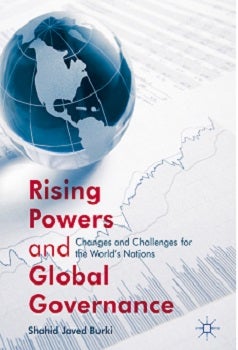
| Title: | Rising Power & Global Governance |
| Author/s: | Shahid Javed Burki |
| Abstract: | This book reinforces the need to understand the sources of global change that is taking place and to accommodate it in the world political, social, and economic systems. Linking the United States, China, India, and Russia along with Europe and the Middle East, the author addresses demographics, international trade, technology, and climate change as global challenges that require cooperation in order to be solved. Both academics and policymakers will be enlightened, discovering ways of addressing global change by working together rather than through confrontation. |
| Date: | 5 February 2017 |
| More From: |
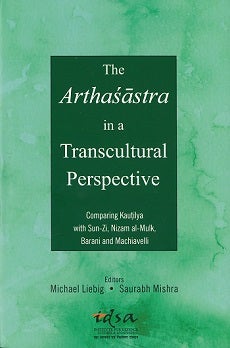
| Title: | The Arthasastra in a Transcultural Perspective: Comparing Kautilya with Sun-Zi, Nizam al-Mulk, Barani and Machiavelli |
| Author/s: | Michael Liebig and Saurabh Mishra |
| Abstract: | This book is the product of a collaborative effort by the Institute for Defence Studies and Analyses, New Delhi; South Asia Institute, Heidelberg University; and Institute of South Asian Studies, National University Singapore. The volume contains papers exploring Kautilya’s Arthasastra in a transcultural perspective, comparing it with the thoughts of Sun-Zi, Nizam al-Mulk, Barani and Machiavelli. It is agreed that the field of modern International Relations (IR) and Political Theory is predominantly Eurocentric, and based on European sources of philosophy and history. But, nowadays, scholars have been exploring the possibility of a world intellectual history, as ideas are dynamic throughout temporal and geographical spaces. They transform, hybridise and travel long distances over a period of time in such a manner that they appear belonging to the place where we find them at a particular point of time. It is also intriguing to observe that India, with a long civilisational and philosophical history, is credited with no contribution to the evolution of the modern IR and Political Theory. Therefore, this volume explores the philosophical systems, thought-figures and ancient cultural spaces, on the path from India to Europe, looking for any possibility of Kautilya’s Arthasastra, the most comprehensive and systematic text available on art of governance from ancient India, having interacted and influenced the evolution of IR and Political Theory that are considered as originally European intellectual contributions. We note that the chapters in this book give ample and convincing reasons for initially believing in the Arthasastra’s value for the evolution of IR and Political Theory, and making further research on Indian contribution to the intellectual history of IR and Political Theory a desideratum. |
| Date: | 9 January 2017 |
| More From: |
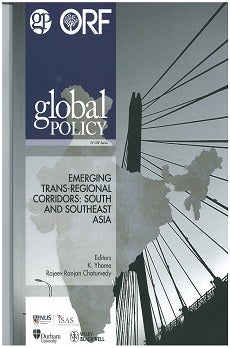
| Title: | Emerging Trans-Regional Corridors: South and Southeast Asia |
| Author/s: | K. Yhome and Rajeev Ranjan Chaturvedy |
| Abstract: | A broadly interconnected Asia sees the simultaneous rise of India and China as strong states and even stronger markets. New ideas and initiatives of trans-regional economic corridors to further link regions of Asia and beyond have been emerging in recent years. China has initiated the Silk Road Economic Belt and Maritime Silk Road (together the One Belt, One Road or OBOR) with the aim to link the country with and those of Central and Southeast Asia, the Indian Ocean region, the Middle East, Africa and Europe. Japan has been involved in developing strategic corridors in South and Southeast Asia. India has been pushing for strengthening its linkages with Southeast Asia and Central Asia. Similarly, the United States has envisioned an Indo-Pacific Economic Corridor to bridge South and Southeast Asia. Within this context, this volume attempts to capture the rationales behind the various initiatives with a specific focus on linking South and Southeast Asia. The papers in the volume assess the economic and strategic implications of the trans-regional economic corridors in South and Southeast Asia. |
| Date: | 3 January 2017 |
| More From: |
Load more


